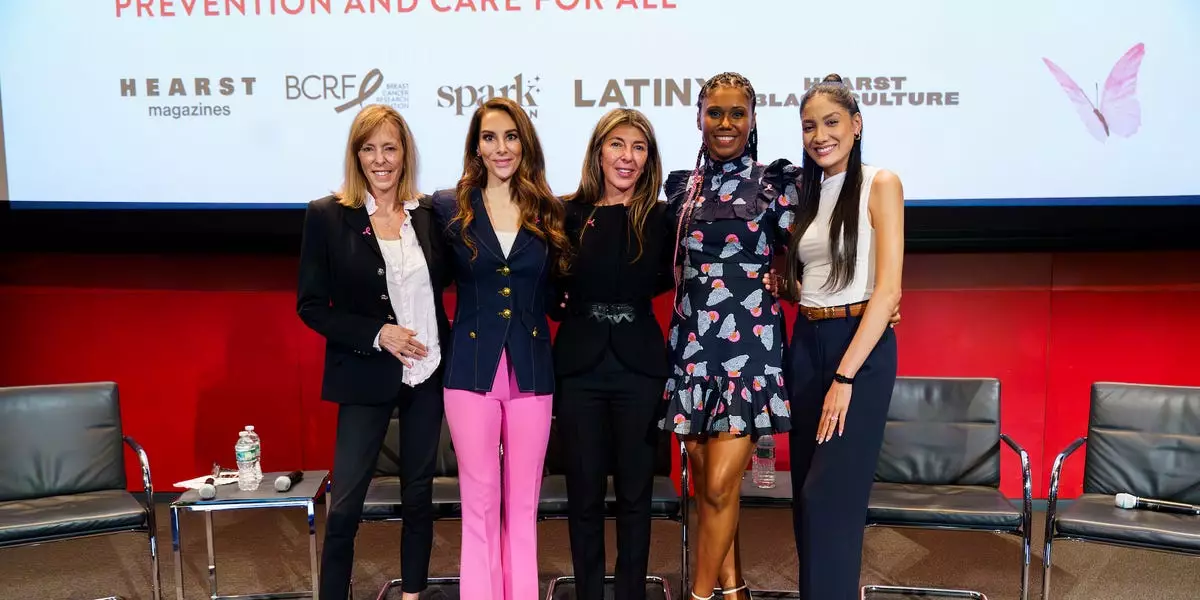Every October, people across the globe engage in Breast Cancer Awareness Month, prompting conversations about this life-altering disease. As part of this initiative, Hearst collaborated with the Breast Cancer Research Foundation (BCRF) to host an event titled “United Against Breast Cancer: Prevention and Care for All.” This discussion brought together a diverse panel of voices, including notable figures from the realms of media and medicine, such as Nina Garcia, Toks Olagundoye, Rebecca Porter, and oncologist Dr. Elizabeth Comen. Their narratives underscore the critical importance of addressing health disparities in breast cancer care and elevating the voices of women who have faced these challenges head-on.
The event was skillfully moderated by Lucy Kaylin, Hearst Magazines’ editorial director, who set the tone by highlighting distressing statistics: Black women in America are 40% more likely to die from breast cancer compared to their white counterparts, while Hispanic women are often diagnosed at younger ages. Such alarming figures not only emphasize the need for urgency in awareness efforts but also illustrate how systemic inequalities manifest in healthcare disparities.
Personal Narratives: The Power of Sharing Experiences
During the panel, the participants candidly shared their medical journeys, revealing common threads that bind their stories together. Dr. Comen expressed her frustration with the way women’s concerns often go unheard, leading to life-threatening delays in diagnosis. She articulated the necessity for women, especially those from marginalized communities, to advocate for themselves in the healthcare system. “So many women know in their bones when something is wrong but face a culture that frequently dismisses their intuition,” she noted.
Rebecca Porter reinforced this point, sharing her personal experience of facing skepticism from healthcare providers despite her strong intuition that something was amiss. Porter’s story echoes the experiences of many women who find themselves pushed aside due to age or lack of family history, facing barriers that could ultimately jeopardize their health.
Dr. Comen’s treatment of self-breast examinations emerged as a key theme during the discussion. She urged women to familiarize themselves with their bodies, suggesting that awareness of one’s normalcy is crucial. This notion is empowering; understanding personal health is a critical step toward effective advocacy and early detection.
Nina Garcia’s experience with the BRCA mutation and her decision to undergo a preventive double mastectomy highlighted another significant aspect of the discussion: the stigma surrounding personal health decisions. Garcia articulated the internal conflict she experienced when deciding to openly share her story. “There was this weight on my shoulder with this information that I had to go through this preventative surgery,” she said. Yet, her husband’s support served as a turning point, prompting her to understand the value of sharing her journey with a broader audience.
The panelists highlighted that these discussions are not merely medical; they are deeply personal. Toks Olagundoye’s apprehension about job security during her treatment illustrated how cultural expectations and workplace pressures can compound the emotional toll of dealing with illness. In the face of uncertainty, her colleagues stood in solidarity, demonstrating that the entertainment industry, often criticized for being unsympathetic, can indeed foster an environment of compassion.
A prevalent theme throughout the panel was the healing power of community. When Garcia spoke of the comfort she found in connecting with women who had similar experiences, it underscored a pivotal insight: facing a health crisis is profoundly isolationist, yet sharing one’s story can forge powerful bonds. “Nothing compares to another woman’s presence,” she remarked, effectively illustrating how solidarity enhances the healing process.
Porter also noted the warmth and love she received from others who had walked the same path, emphasizing how important it was to feel seen and heard. This sentiment reflects a growing recognition of the importance of collective support in overcoming personal health battles.
The discussion brought to light the importance of advocacy in reshaping the narrative surrounding breast cancer. The stories shared by these remarkable women serve as vital testaments to resilience, urging a collective reevaluation of how society, particularly within healthcare systems, can improve the standards of care for all women.
Breast Cancer Awareness Month will continue to act as a platform for raising awareness, but beyond the pink ribbons and campaigns, the authentic voices of women like Garcia, Olagundoye, Porter, and Dr. Comen remind us that empowerment lies in sharing our stories, advocating for ourselves and each other, and ultimately, confronting the inequities that persist within our healthcare systems.

